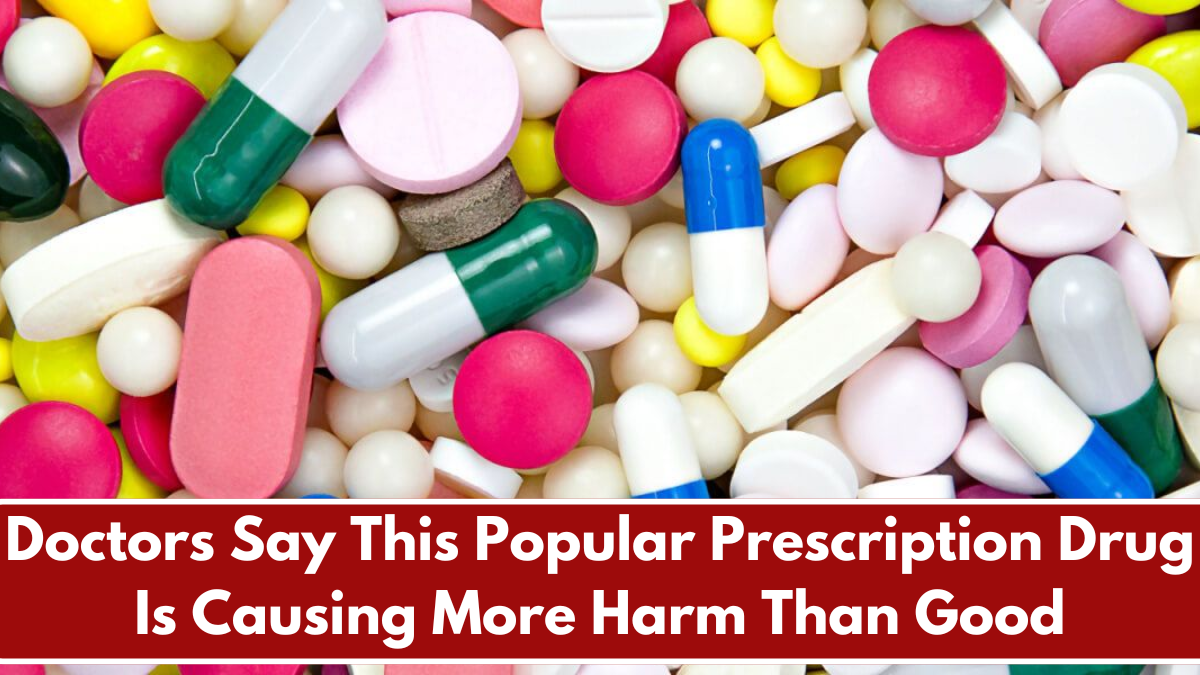Millions of people around the world rely on prescription medications to manage chronic conditions, relieve pain, and improve their quality of life. However, what if the very drug that is supposed to help you is actually causing more harm than good? Recent reports and medical studies have raised concerns about a widely prescribed drug that may be leading to serious side effects, long-term health complications, and even worsening the conditions it was meant to treat.
For decades, this medication has been prescribed to millions of patients, often with little warning about its potential dangers. Many people assume that because a drug is FDA-approved and prescribed by doctors, it must be safe. But the reality is that many pharmaceutical drugs carry hidden risks, and some of them are causing more harm than anyone expected.
In this article, we’ll take a closer look at this controversial prescription drug, the alarming health risks associated with it, why doctors are speaking out, and what alternative options patients may have.
The Popular Prescription Drug That May Be Harming You
1. The Drug That Millions Take Without Question
One of the most commonly prescribed drugs in the world, this medication is often recommended for conditions such as pain management, anxiety, depression, high blood pressure, acid reflux, or sleep disorders. It is widely available, and many people take it daily without questioning its safety. However, new research suggests that long-term use of this drug may be leading to severe health issues, dependency, and even increased mortality rates.
Despite being a top-selling drug, doctors and researchers are now sounding the alarm, revealing that this medication may not be as safe as once believed.
2. The Hidden Side Effects and Health Risks
While all medications come with potential side effects, this particular drug has been linked to a range of serious health complications that are often downplayed or overlooked by pharmaceutical companies. Some of the most alarming side effects include:
- Increased Risk of Heart Disease: Studies have shown that prolonged use of the drug may contribute to heart problems, including high blood pressure, irregular heartbeats, and a higher risk of heart attack or stroke.
- Kidney and Liver Damage: Long-term consumption can put excessive strain on the liver and kidneys, leading to potential organ failure over time.
- Mental Health Decline: Many patients who take this drug for anxiety or depression report worsening symptoms, including mood swings, suicidal thoughts, and cognitive decline.
- Increased Risk of Dependency and Withdrawal Symptoms: Some drugs, particularly those used for pain management, sleep disorders, or anxiety, can lead to dependency. Patients who try to stop taking them may experience withdrawal symptoms, including insomnia, anxiety, tremors, and nausea.
- Gastrointestinal Issues: This medication has been linked to digestive problems, ulcers, acid reflux, and even an increased risk of stomach cancer with prolonged use.
Despite these serious risks, many doctors continue to prescribe this drug because it is considered the “standard treatment” for certain conditions. However, more healthcare professionals are now urging caution and exploring safer alternatives.
3. Why Do Doctors Continue to Prescribe It?
If this drug is so dangerous, why is it still being prescribed? The answer lies in the complex relationship between the pharmaceutical industry, medical professionals, and regulatory agencies.
- Pharmaceutical Companies Profit from Prescriptions: Drug manufacturers invest billions of dollars in marketing their products to doctors and hospitals. Many medical professionals trust the information provided by pharmaceutical companies without questioning the long-term effects of the drugs they prescribe.
- Lack of Awareness Among Doctors and Patients: Some healthcare providers are unaware of the latest studies linking this medication to severe health risks. Patients, too, may not be fully informed about the potential dangers when they receive their prescription.
- Quick Fix Over Root Causes: In modern medicine, there is a tendency to treat symptoms rather than address the root cause of a condition. This leads to the over-prescription of drugs that provide short-term relief but cause long-term harm.
As awareness grows, more doctors are beginning to reconsider the safety of this drug and explore alternative treatments that may be safer and more effective.
What Are the Alternatives?
For patients who are concerned about the risks of this drug, there are several alternative treatment options that may be safer and equally effective. Some of these include:
- Lifestyle and Dietary Changes: Many conditions treated by this drug, such as high blood pressure, anxiety, or acid reflux, can be managed with dietary improvements, stress reduction techniques, and regular exercise.
- Natural Remedies and Supplements: In some cases, herbal remedies, vitamins, and alternative medicine can provide relief without the risks associated with pharmaceuticals. For example, magnesium, melatonin, and herbal teas can help with anxiety and sleep disorders, while omega-3 fatty acids and a Mediterranean diet may support heart health.
- Physical Therapy and Holistic Treatments: For conditions like chronic pain, alternative therapies such as physical therapy, acupuncture, chiropractic care, and massage therapy can provide relief without the need for prescription medications.
- Safer Prescription Alternatives: If medication is necessary, patients can ask their doctor about newer or less harmful alternatives with fewer side effects and lower risks of dependency.
Conclusion
The shocking truth is that millions of people are taking a prescription drug every day that may be doing more harm than good. While it is widely prescribed and trusted by patients and doctors alike, growing evidence suggests that it may be linked to serious health risks, dependency, and even life-threatening conditions.
Many people assume that because a drug is legal and FDA-approved, it must be safe. However, the reality is that pharmaceutical companies have a history of downplaying risks and prioritizing profits over patient safety. That’s why it’s more important than ever for patients to educate themselves, ask questions, and consider alternative treatments.
If you are currently taking a prescription medication and are concerned about its potential risks, talk to your doctor about safer options. There may be natural remedies, lifestyle changes, or alternative treatments that can help you achieve better health without the dangers of harmful pharmaceuticals.
The choice is yours: continue trusting a system that may not have your best interests at heart, or take charge of your health and explore safer alternatives today.
FAQ’s:
1. What is the prescription drug that doctors are warning about?
There are several prescription drugs that have come under scrutiny for their harmful side effects. However, the most concerning ones are medications commonly used for pain management, anxiety, high blood pressure, acid reflux, and depression. These drugs are often prescribed without fully informing patients about their long-term risks, including dependency, organ damage, heart issues, and mental health deterioration. Many of these medications were once considered safe, but new research has revealed serious consequences associated with long-term use.
2. What are the most dangerous side effects of this drug?
The dangers of this drug vary depending on the type and category it falls into, but some of the most concerning side effects include:
- Heart problems, including increased blood pressure, irregular heart rhythms, and even a higher risk of heart attacks.
- Kidney and liver damage, as the body struggles to process the medication over time.
- Mental health risks, including severe mood swings, depression, anxiety, and suicidal thoughts.
- Gastrointestinal issues, such as ulcers, acid reflux, and even an increased risk of stomach cancer.
- Dependency and withdrawal symptoms, making it difficult to stop taking the drug without serious side effects.
Despite these risks, many doctors continue to prescribe these drugs as first-line treatments without discussing safer alternatives with their patients.
3. If the drug is so harmful, why is it still being prescribed?
There are a few reasons why these drugs continue to be widely prescribed:
- Pharmaceutical companies prioritize profits, often downplaying risks while heavily marketing their products to doctors.
- Doctors may not be aware of recent studies linking these medications to severe health complications.
- Medical culture favors quick fixes, meaning doctors often prescribe drugs rather than addressing the root cause of a condition.
- Patients demand immediate relief, and these medications offer fast but temporary solutions, even if they cause long-term harm.
Many experts believe that the medical industry is too reliant on pharmaceutical solutions rather than lifestyle changes or alternative treatments that may be safer.
4. Can this drug cause dependency or addiction?
Yes, certain prescription medications are highly addictive, particularly those used to manage pain, anxiety, and sleep disorders. Drugs such as opioids, benzodiazepines, and certain antidepressants can create a physical and psychological dependency, making it extremely difficult for patients to stop taking them.
Even non-addictive drugs, such as those for blood pressure or acid reflux, can lead to “rebound effects,” where stopping the medication suddenly worsens symptoms. This can create a cycle where patients feel trapped in long-term medication use.
5. What are the long-term health risks of taking this drug?
Long-term use of certain prescription drugs can lead to severe health deterioration over time. Some of the most concerning risks include:
- Increased risk of chronic diseases like heart disease, diabetes, and organ failure.
- Weakened immune system, making it easier to get sick.
- Brain fog, memory issues, and cognitive decline, especially with medications affecting the nervous system.
- Hormonal imbalances, which can affect metabolism, mood, and overall well-being.
Many people assume prescription drugs are safe for long-term use, but some medications cause more damage the longer they are taken.
6. How do pharmaceutical companies influence medical decisions?
The pharmaceutical industry plays a major role in shaping medical practices. Drug companies:
- Spend billions of dollars marketing directly to doctors, influencing their prescription habits.
- Fund medical research, which sometimes leads to biased studies that favor their drugs.
- Lobby government agencies, making it difficult for harmful drugs to be removed from the market.
- Offer financial incentives, such as free samples, speaking fees, and consulting opportunities for doctors.
This system often leads to medications being overprescribed, even when safer alternatives exist.
7. Are there safer alternatives to this drug?
Yes, depending on the condition being treated, there are often safer, more natural alternatives to prescription medications. Some options include:
- Lifestyle changes such as diet, exercise, and stress management for conditions like high blood pressure, anxiety, and acid reflux.
- Natural supplements like magnesium for anxiety, melatonin for sleep, or turmeric for pain management.
- Physical therapy, acupuncture, and chiropractic care for chronic pain relief.
- Cognitive-behavioral therapy (CBT) for mental health conditions instead of relying solely on medication.
While some conditions may require medication, many people can reduce or eliminate their dependency by exploring holistic and lifestyle-based treatments.
8. How can I tell if my prescription medication is causing harm?
Many people take medications for years without realizing that their symptoms may actually be caused by the drug itself. Warning signs include:
- New or worsening symptoms, such as increased anxiety, digestive issues, or chronic fatigue.
- Frequent headaches, dizziness, or unexplained pain.
- Feeling dependent on the medication, struggling with withdrawal symptoms when trying to stop.
- Increased risk of infections or weakened immunity.
If you suspect your medication is causing more harm than good, talk to your doctor about alternative treatments or tapering off safely.
9. How should I talk to my doctor about switching to a safer option?
If you’re concerned about the risks of your prescription drug, follow these steps when speaking to your doctor:
- Do your research beforehand and come prepared with studies or articles about the risks.
- Ask about alternative treatments, including natural options or lifestyle changes.
- Request a gradual reduction plan, if necessary, to avoid withdrawal symptoms.
- Seek a second opinion if your doctor dismisses your concerns.
Many doctors are willing to explore alternative treatments, but it’s important for patients to be proactive about their health.
10. What steps can I take to protect myself from harmful medications?
To protect yourself from prescription drugs that may be causing harm, follow these guidelines:
- Always read about potential side effects before taking any medication.
- Ask your doctor about non-drug alternatives for managing your condition.
- Avoid long-term medication use when possible, especially for conditions that can be managed naturally.
- Monitor your health closely and report any negative symptoms to your doctor.
- Stay informed about new research, as medical recommendations change over time.
Many people assume that if a doctor prescribes it, it must be safe, but the truth is that not all medications are necessary, and some may do more harm than good. Being an informed patient is the best way to protect your health and make smarter choices about the medications you take.



